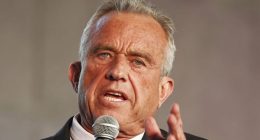
A key advisory panel to the Food and Drug Administration overwhelmingly rejected recommending Pfizer booster shots for most recipients of the company’s coronavirus vaccine, instead endorsing them only for people who are 65 or older or at high risk of severe Covid-19.
The vote — the first on boosters in the United States — was a blow to the Biden administration’s strategy to make extra shots available to most fully vaccinated adults in the United States eight months after they received a second dose. The broader rollout was to start next week.
Committee members appeared dismissive of the argument that the general population needed booster shots, saying the data from Pfizer and elsewhere still seemed to show two shots protected against severe disease or hospitalization and did not prove a third shot would stem the spread of infection. Some also criticized a lack of data that an additional injection would be safe for younger people.
“It’s unclear that everyone needs to be boosted, other than a subset of the population that clearly would be at high risk for serious disease,” said Dr. Michael G. Kurilla, a committee member and official at the National Institutes of Health.
But the panel’s final recommendation left some room for the White House to argue that the core of its booster strategy remains intact. Depending on how “at high risk” is defined, tens of millions of Americans could conceivably wind up eligible for additional shots of the Pfizer vaccine.
The committee of largely outside experts voted 16 to 2 against a Pfizer booster for people 16 and older after a tense daylong public discussion that put divisions within the agency and the administration on public display. Officials from the Centers for Disease Control and Prevention and the National Institutes of Health joined infectious disease experts and doctors in voting against additional shots for such a broad swatch of the population.
Dr. Paul Offit, a committee member and the director of the Vaccine Education Center at Children’s Hospital of Philadelphia, questioned whether extra shots would do much at all to change the arc of the pandemic. “We all agree that if we really want to impact this pandemic, we need to vaccinate the unvaccinated,” he said.
But the panel unanimously embraced a fallback position to limit additional shots to the elderly and others at high risk of severe Covid illness. Then, after an informal poll pushed by a senior F.D.A. official, committee members specified that health care workers, emergency responders and others whose jobs put them at special risk should also be eligible for the booster shots. The official — Dr. Peter Marks, who oversees the F.D.A.’s vaccine division — said the at-risk group would also include teachers.
Biden aides noted that under the White House’s plan to offer booster shots eight months after the second injections, that same group would be first in line because they were vaccinated earliest.
The F.D.A. has the final word on vaccine approvals, and while it is not obliged to follow the committee’s recommendations, it typically does. The agency will likely issue a decision by early next week.
Understand Vaccine and Mask Mandates in the U.S.
-
- Vaccine rules. On Aug. 23, the Food and Drug Administration granted full approval to Pfizer-BioNTech’s coronavirus vaccine for people 16 and up, paving the way for an increase in mandates in both the public and private sectors. Private companies have been increasingly mandating vaccines for employees. Such mandates are legally allowed and have been upheld in court challenges.
- Mask rules. The Centers for Disease Control and Prevention in July recommended that all Americans, regardless of vaccination status, wear masks in indoor public places within areas experiencing outbreaks, a reversal of the guidance it offered in May. See where the C.D.C. guidance would apply, and where states have instituted their own mask policies. The battle over masks has become contentious in some states, with some local leaders defying state bans.
- College and universities. More than 400 colleges and universities are requiring students to be vaccinated against Covid-19. Almost all are in states that voted for President Biden.
- Schools. Both California and New York City have introduced vaccine mandates for education staff. A survey released in August found that many American parents of school-age children are opposed to mandated vaccines for students, but were more supportive of mask mandates for students, teachers and staff members who do not have their shots.
- Hospitals and medical centers. Many hospitals and major health systems are requiring employees to get a Covid-19 vaccine, citing rising caseloads fueled by the Delta variant and stubbornly low vaccination rates in their communities, even within their work force.
- New York City. Proof of vaccination is required of workers and customers for indoor dining, gyms, performances and other indoor situations, although enforcement does not begin until Sept. 13. Teachers and other education workers in the city’s vast school system will need to have at least one vaccine dose by Sept. 27, without the option of weekly testing. City hospital workers must also get a vaccine or be subjected to weekly testing. Similar rules are in place for New York State employees.
- At the federal level. The Pentagon announced that it would seek to make coronavirus vaccinations mandatory for the country’s 1.3 million active-duty troops “no later” than the middle of September. President Biden announced that all civilian federal employees would have to be vaccinated against the coronavirus or submit to regular testing, social distancing, mask requirements and restrictions on most travel.
An advisory committee of the C.D.C. is scheduled to meet Wednesday and Thursday to discuss booster shots before that agency, which sets vaccine policy, issues recommendations on who should get them.
Critics of the administration’s booster strategy as overly broad or premature said the advisory committee acted as a necessary check Friday.
The meeting “put the F.D.A. back in the driver’s seat,” said Dr. Luciana Borio, a former acting chief scientist at the agency. The expert panel, she said, “was allowed to maintain its scientific independence. It understood there were significant limitations with the data presented and that the F.D.A. needs to review the data carefully before making a decision.”
Apoorva Mandavilli and Sheryl Gay Stolberg contributed reporting.
Source: Source: NYT









